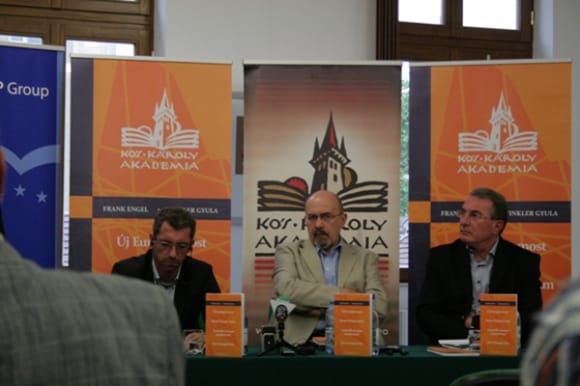The European Union has to be redirected on its very first path, the path thought-out by its founding fathers and which will lead, inevitably, to the construction of a federal Europe that is truly politically unified. This was the main conclusion which came from the debate entitled “New Europe Now”, which had been organized in Cluj, on 27th of June. The president of “Kós Károly Akadémia” Foundation, RMDSZ Senator Markó Béla, and his guests Iuliu Winkler MEP (RMDSZ, EPP) and Frank Engel MEP (CSV, EPP), debated on the future of the EU seen as a sovereign federation and the need to exert the maximum influence on European and national leaders on behalf of their citizens in order to generate a serious and profound debate across Europe regarding this topic. The discussions were moderated by Kovács Péter, the director of “Kós Károly Akadémia” Foundation.
MEP Frank Engel from Luxemburg addressed the fact that the creation of a United States of Europe (USE), namely the federalization of Europe, is an old project, of almost 60 years, USE being, in fact, the result of the founding fathers’ vision. Engel explained that, during the process of building a federal Europe, things were blocked at the stage of the common market and of the economic integration of the Member States; their political integration being forgotten. According to him, the EU is in danger of becoming irrelevant on the global stage because, organized as it is now, the EU doesn’t have enough force to face neither the globalization nor the power of states such China or India. “Europe used to be a source of inspiration for the entire world. Europe invented almost everything which matters today. Europe led the world once, and now Europe is facing the danger of falling into irrelevance on the global stage. (…) The EU cannot be led under part-time jobs during the night”, said the MEP from Luxemburg, referring to the European summits of heads of the Governments and the Member States. In his opinion, the process of creating the USE is obstructed by leaders who are not able to see the fact that nation states are obsolete entities now, entities which don’t have the capability of facing the global challenges and of whose end is sooner rather than later inevitable.
In turn, Iuliu Winkler presented the fact that at the European level there have appeared several scenarios regarding the future of Europe, and one of the worst of these sees the salvation of Europe, out its economic and social crisis, through the creation of a Union developing at two or more speeds, split between North and South, East and West, new and old Member States.
He said that when taking the many proposed scenarios into consideration in today’s context the Member States from Central and Eastern Europe have to become more significant actors in the debate about the future of Europe as soon as possible.
Unfortunately – Winkler added – we, the Europeans who were left behind the Iron Curtain, have accumulated a different experience. He pointed out the fact that Eastern-Europeans had lived for decades split from the rest of Europe. Referring to the nation state as an obsolete entity, Iuliu Winkler said that a federal Europe can be built on its regions and communities. In his opinion, unlike the nation states, these sort of entities are naturally born, being the most solid elements which can stand at the basis of the USE. He underlined the fact that USE must be built on the real support of its citizens and on a more powerful European Parliament with more competencies.
Interjecting his opinion, Senator Markó Béla said that, nowadays, the EU is crushed by a profound internal conflict, much more harmful than the global crisis. In his opinion, the building of a federal Europe on a healthy basis in which any of its communities will not be placed one above another is the solution to put this conflict to an end. Markó Béla showed the fact that the people from Central Europe used to live in a sort of federal Europe inside the Austro-Hungarian Empire. According to the Senator, these people can bring the experience into a new Europe truly united with a unique political point of view, into a Europe based on its regions and communities and in which, unlike in the former empire, all its citizens must be equal, without any citizen falling into second class category. Markó Béla explained that a federal Europe can easily be built starting from economic and trade relations pillars, but that process becomes difficult when the approach is deeper and is linked to issues of ethnicity, culture and identity. The president of the “Kós Károly Akadémia” Foundation hopes for a Europe more preoccupied, for example, with the issues of ethnicity and the linguistic problems rather than dealing with the compulsory size for tomatoes and cucumbers which can be sold in the markets across the Union.
The debate in Cluj was also a pretext for the launching of the book entitled “New Europe Now” which includes the thoughts of Frank Engel and Iuliu Winkler regarding the future of the EU. The contribution of Frank Engel is gathered in a “Draft Manifesto for USE” and the opinion of Iuliu Winkler in an essay entitled “United Europe, a different kind of Europe”. The texts, in Hungarian, Romanian, English and French, were reunited in the book edited by “Kós Károly Akadémia” Foundation.
On this occasion, a website www.neweuropenow.ro was launched, where the book can be downloaded. This website wishes to become a platform for debate regarding the future of United Europe








